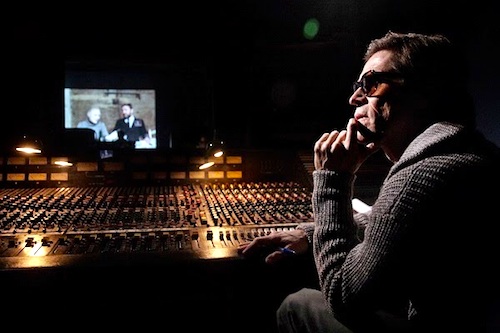By Joe Bendel. In 1926, Pier Paolo Pasolini’s father foiled an attempt to assassinate Benito Mussolini. Unfortunately, there would be nobody to intercede when Pasolini fils was murdered, most likely by a gay hustler, but the Italian auteur’s death has almost spawned as many conspiracy theories as the Kennedy assassination. The filmmaker’s final days are now the subject of Abel Ferrara’s speculative passion play, Pasolini, which screens during the 52nd New York Film Festival.
Ferrara’s affinity for Pasolini makes perfect sense, given the penchant they share for sexually and religiously charged subject matter. As Ferrara’s film opens, Pasolini is wrapping post-production on his Marquis de Sade opus, Salò, or the 120 Days of Sodom. To this day, it remains one of the most controversial and difficult films ever produced by a prestige filmmaker. Of course, Pasolini was always an extreme figure, politically and aesthetically (holding the dubious distinction of having been expelled from the Italian Communist Party on moral grounds).
Ferrara builds an atmosphere of foreboding and paranoia, clearly inviting the audience to suspect anyone so uncompromising must be a danger to the powers that be. Yet, Pasolini recklessly indulges in the hedonistic lifestyle that will ultimately kill him. Ferrara intercuts his prowling about Rome’s seedy night spots with scenes from the outlandish allegory that would have been his next film: Porno-Teo-Kolossal, a sort of riff on the Biblical Three Wise Men, in which an old Holy fool’s pilgrimage takes him to Sodom’s traditional orgy, where the city’s gays and lesbians come together to procreate.
Truly, Pasolini reflects both the absolute worst and best of Ferrara’s instincts. It is talky, pretentious, and features more explicit gay sex than any non-homophobic straight cineaste ever needs to see. Yet, the operatic sweep of it all is rather overwhelming. Ferrara creates a pungent sense of 1970s Rome, simmering with crime and ideology. Dark and sleazy, it all radiates malevolence thanks to cinematography Stefano Falivene.

Frankly, Willem Dafoe, a frequent Ferrara co-conspirator, makes a downright spooky Pasolini stand-in. He is so gaunt and dissipated looking, the audience might throw him an intervention if he appears at a screening. Watching him play out Pasolini’s final days is like watching a ghost. For better or worse, it is his film and perhaps his career role, but it is also quite eerie to see Pasolini favorite Ninetto Davoli wayfaring through the “Maestro’s” unmade film.
Pasolini is bold auterist filmmaking and a quality period production. It is also rather a mess, but it should not be lightly dismissed. Despite or because of Ferrara’s myriad excesses, when you walk out of his Pasolini, you know you saw a film. Recommended for fans of Ferrara and Pasolini at their most Ferrara and Pasolini, Ferrara’s Pasolini screens this Thursday (10/2) at Alice Tully Hall and Friday (10/3) at the Gilman, as Main Slate selection of this year’s NYFF.
LFM GRADE: B-
Posted on October 1st, 2014 at 12:32pm.